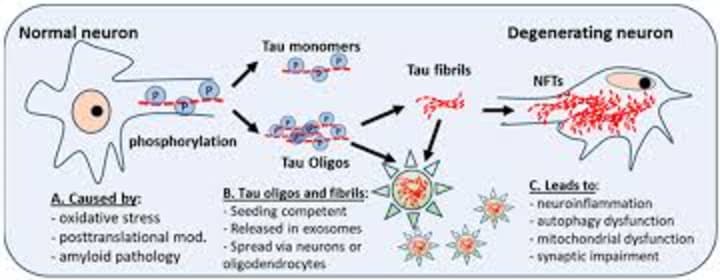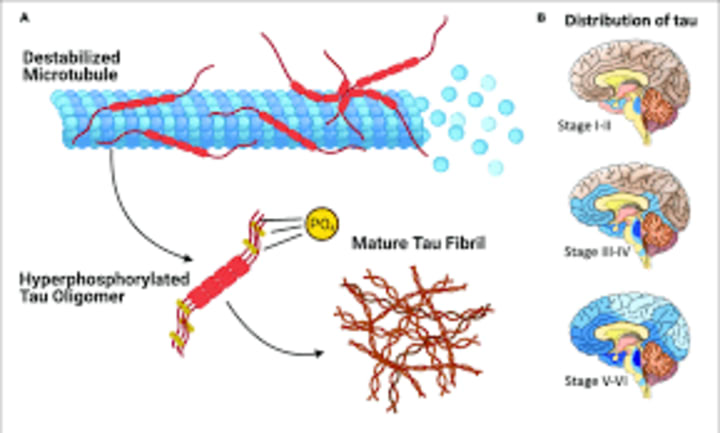Alzhiemer - A tangled complications
Alzheimer’s disease is a common neurological disorder that typically affects individuals over the age of 65. This prevalent condition is found in approximately one in ten people worldwide. Current research has identified various factors contributing to the progression of Alzheimer’s disease, from its initial onset in the brain to its final stages, which include significant shrinkage of gray matter and overall brain volume loss.
In Alzheimer's disease, the main components responsible for its progression include amyloid beta and tau proteins. Amyloid beta, in particular, forms a sticky substance that aggregates to create plaques in the brain. Beta-amyloid is a protein fragment, and these aggregates appear to be toxic to neurons, disrupting cell-to-cell communication when they clump together.
In neuronal tubules, tangles and tau proteins coexist. According to the tau hypothesis, abnormalities in tau protein are indicative of impending disease. As the microtubules in the cell's cytoskeleton deteriorate, the photoreceptor transport system disintegrates, ultimately leading to cell destruction.
By damaging nerve cells and the associated neurons, this, in turn, creates various tangles and plaques that obstruct transmission between the synapses of the neurons. These tubular structures inhibit certain substances from functioning as memory-enhancing compounds.
This disease is typically found in adults over the age of 65, and it is common in this age group. However, we are now observing cases in individuals as young as 30 and even younger.
First and foremost, the initial stages of the case involve memory impairment in adults or adolescents, characterized by lapses in daily routine activities. This progression may also indicate the onset of dementia. In the later stages, memory impairment in the brain advances in such a way that, while medication is available to slow the progression, it cannot be completely halted.

In this scenario, a healthy brain contains neurons that allow neurotransmitters to communicate with one another through the various branches of the brain. However, the formation of plaques and tangles, caused by abnormal proteins, disrupts communication between neurotransmitters at the synapse.
Microglia, which protect brain neurons, also consume plaques; however, this action can lead to the harmful production of cytokine storms, which in turn damages the branches of neurons.
In the final stages of brain deterioration, the hippocampus begins to shrink, leading to a reduction in overall gray matter volume. This decline ultimately progresses toward the final stages of brain death.
In the final stages, numerous symptoms may manifest, including memory impairment, an inability to perform routine tasks, and a lack of communication with social groups on a daily basis.
Symptoms of Alzheimer's Disease
In the initial stages, forgetfulness is often the first symptom to be observed in cases of Alzheimer's disease, manifesting as misplacing items such as keys and glasses around the house.
Sometimes, you may struggle to remember the current conversation or forget the names of your friends. Memory impairment can occasionally lead to symptoms such as nausea, vomiting, and headaches, particularly in the brain regions responsible for cognitive functions.

In later stages, you may find it challenging to maintain your routine of cooking, reading morning quotes, or completing daily tasks. Activities such as managing stocks on a daily basis can become difficult, and at times, you may feel fatigued throughout the day.
Depression may contribute to the development of Alzheimer's disease, particularly in individuals experiencing major illnesses. Symptoms such as dizziness, fatigue, and memory impairment can manifest during depressive episodes. Additionally, genetic factors may play a significant role, especially in individuals over the age of 65.

Disorientation and confusion can also occur during this stage, leading to an increased rate of forgetfulness. Tasks that you completed just a few minutes ago may become unmemorable. As a result, your memory impairment may worsen, and you may also be more likely to withdraw from social interactions and communication with others.
You may lose the ability to think about future plans and activities that are essential for your daily routine. This can lead to social withdrawal and negative thoughts, making it difficult for you to confront life's challenges. As a result, you may feel disheartened by failures, lose hope, and struggle to enjoy the moments in your life.
Conclusion
In medical terminology, if we refer to the later stages or the most advanced stage of Alzheimer's disease, it is characterized by a significant reduction in brain gray matter and volume. This deterioration can be life-threatening, and in severe cases, it may even lead to death.
you can reach me shishir274@gmail.com






Comments